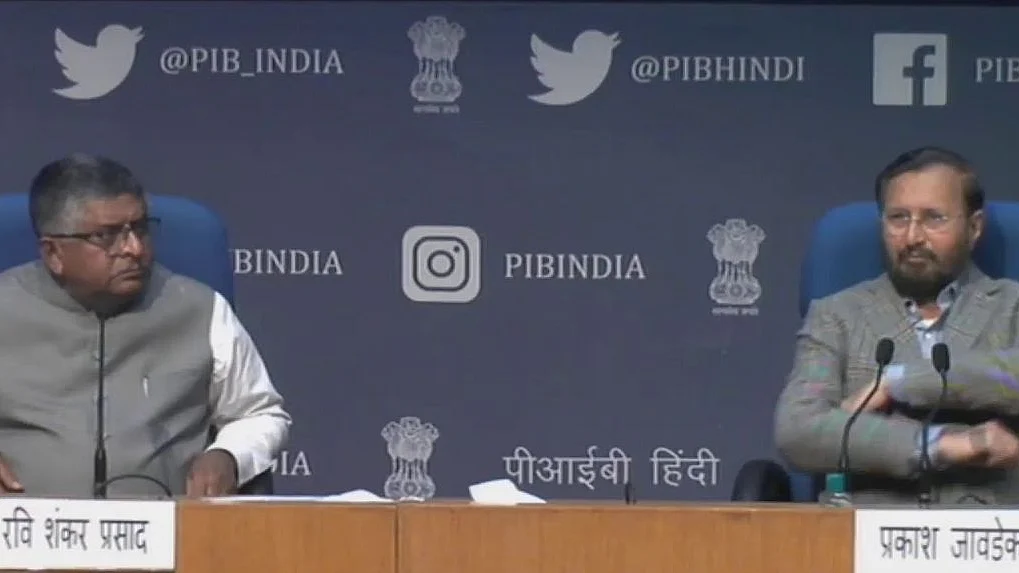Do you need to be worried about your digital footprint?
The new rules notified by the government, though not backed by any law, give it the power to censor content and ensure enough chilling effect to demand self-censorship

In one sweeping action last week the central government issued new rules and regulations to control social media as well as digital news and OTT platforms. The 29-page long regulations have triggered animated conversation on how the government is planning to introduce more stringent censorship of digital content.
As many as 530 million Indians (53 Crore) use WhatsApp according to the data released by the Government. While Facebook users number 410 million, YouTube and Instagram users number 448 and 210 million Indians respectively. In comparison Twitter users are said to number only 17.5 million.
Experts are unanimous in saying that both big tech companies like Facebook and Twitter and digital content need better regulations than provided by the rules framed last in 2011 or in the Information Technology Act of 2000. But they question the manner in which the government has gone about introducing these rules.
The rules are not backed by any law, they say, and the government has usurped the role of the Parliament in framing the rules. Even the Press Council of India functions under a law passed by Parliament. But these new rules have no legal framework, just an executive fiat.
Consultations have been held by the Government since 2018 but experts involved in those consultations say that provisions in the new rules were never discussed then.
The rules have empowered the government with the power to block sites, remove digital content and demand that intermediaries or service providers track down the ‘originator’ of the offensive text or digital content who first generated the content on Facebook, WhatsApp, Twitter or YouTube.
Experts say that this will not only put an end to End-to-End encryption but also affect the privacy of users. It will add to the cost of digital news providers and other platforms, who will have to invest in more manpower and technology to be able to oblige the Government.
The rules do not specify when the Government can make such requests; nor what will be deemed as problematic, affecting public order or seditious. If a politician in Tamil Nadu criticizes the Sri Lankan government for its treatment of Tamils there, will this be construed as affecting friendly relations with a foreign country? Or if someone praises something in Pakistan or Bangladesh, will this be deemed objectional? Nobody knows.
The Government’s intent also appears suspect because over the past several years, it has allowed cases of cyber bullying, cyber crime and hate speech to grow in the digital space. Little or no action was taken against people openly propagating violence. It is an open secret that BJP’s IT Cell promoted fake news and videos.
Fact checking website AltNews listed at least 15 such cases. But no action was taken by the Government. This has given rise to apprehension that the Government’s Oversight Committee will be both selective and arbitrary. There are already laws to deal with sedition or incitement to violence besides defamation.
A BJP leader in Kerala can promise supply of good quality beef if elected; or a union minister from Arunachal Pradesh can tweet that he eats beef and nobody can stop him. But if a Muslim posts similar messages in the digital space, will he be held responsible for disturbing public order or incitement? The rules do not make it clear.
What is more, these rules suggest that online content can be held responsible for instigating ‘offline violence’ and take the focus away from the actual perpetrators of violence on the street.
Speaking at a webinar organised by the 'Prayas Hairsplitters Club', Cyber Law expert Pavan Duggal said he foresaw a tremendous increase in litigation because the new rules have set a time frame to punish the offenders.
In March 2015 the notorious Section 66 A of the IT Act was quashed by the Supreme Court as being 'unclear' and 'biased'; but these new rules have ushered in the same confusion and lack of clarity through the backdoor.
Asked if the new rules will be able to check the activities of political parties in spreading disinformation, he added, " I don't think the new regulations would be able to check their activities because the rules say they have to punish the person who filed the first offending news and not those who copy and spread it. How does one prove who threw the 'first stone’."
It is a well-known fact that several journalists and highly qualified persons are working at very hefty salaries in these IT cells whose job is to pounce on any view that goes against the chosen few. In addition the Home Ministry is in the process of recruiting a ‘volunteer force’ to identify and report objectionable content on social media.
Technical advances had made hiding evidence very easy, said the cyber lawyer. Earlier criminals were scared of the law. "Today they come to lawyers after destroying the SIM card, mobile phone and computers and confess that they had committed a fraud,” Duggal confided.
Follow us on: Facebook, Twitter, Google News, Instagram
Join our official telegram channel (@nationalherald) and stay updated with the latest headlines
